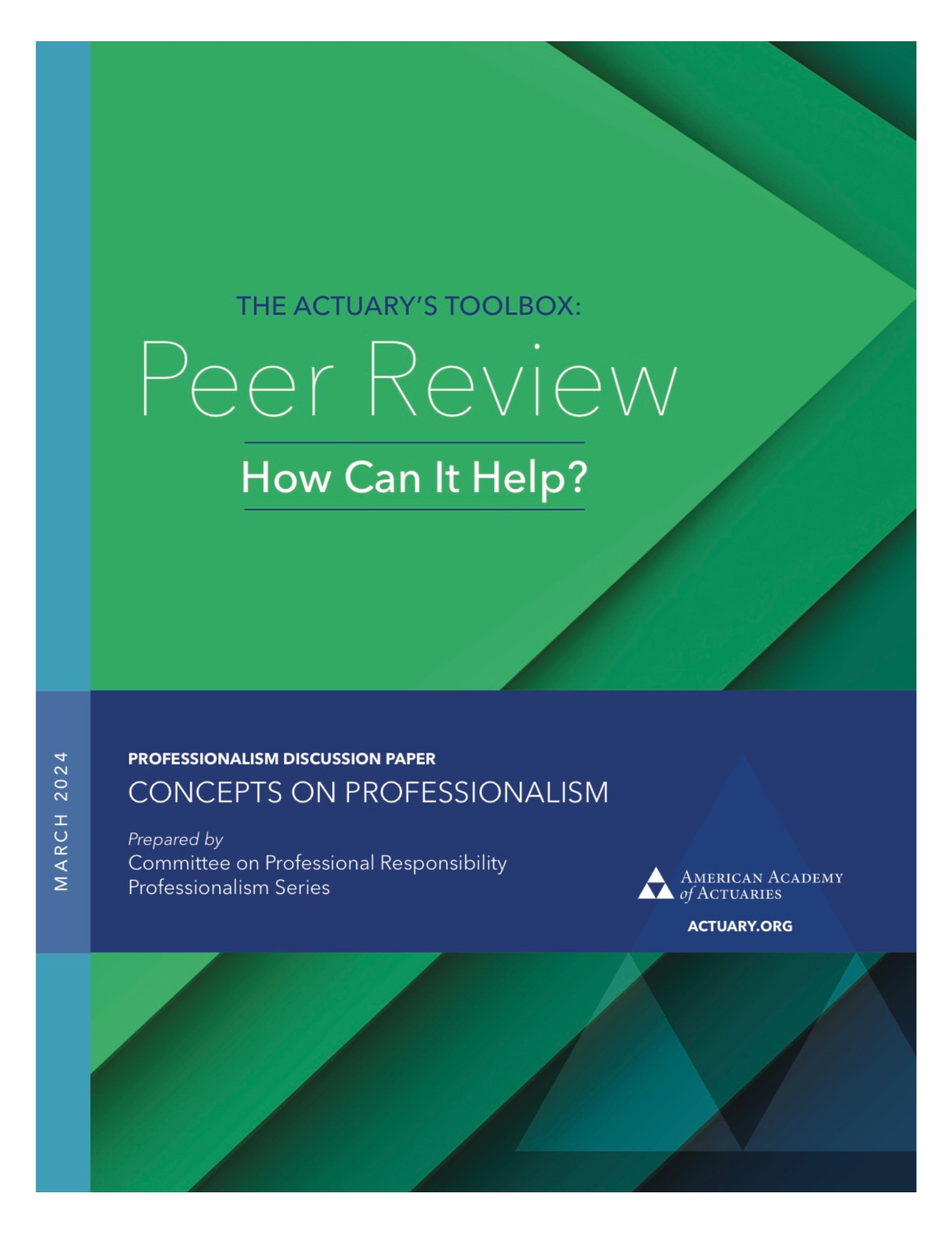Professionalism Counts, March 2024
Q&A: The Actuary’s Toolbox: Peer Review—How Can It Help?
The Committee on Professional Responsibility (COPR) recently released a new discussion paper, The Actuary’s Toolbox: Peer Review—How Can It Help? Two of the actuaries involved in writing the paper—Harry Hotchkiss and Karin Swenson-Moore—offered their insights.
Why is peer review important?
Karin Swenson-Moore: Peer review is part of being an actuarial professional and ensuring we deliver the highest quality work and recommendations to our principal and meet our professional standards.
Harry Hotchkiss: Agreed. You have to do that day in, day out. It is important to have a knowledgeable peer thoroughly review your work. It’s gut-wrenching to learn your work contains a material error after its release.
When I first delivered Medicare stop-loss pricing, the stop-loss covered Part A (hospital), Part B (medical), and Part D (prescription drugs). I had expertise on Parts A and B, but not Part D. The peer reviewer had the same scope of expertise. When our work was released internally, a Part D expert found we had materially missed a key component. My reputation was tarnished.
The following year, I recruited a second actuary—a Part D expert—to help update the model and assumptions and peer review the pricing. Our work was accepted, and over time my reputation was restored. This incident happened well into my actuarial career. Peer review is important not just for less experienced actuaries, but also for seasoned actuaries.
If you were performing a peer review, what would you look for?
HH: First, it’s important to determine the scope of the peer review. I prefer the other actuary to document what they want me to peer review. We would agree on a due date and meet to walk through my findings. The actuary would then have time to revise their work, if needed.
KSM: There are different aspects of peer review. There’s the technical work: Is the model working as expected? Is the data accurate and reasonable? Are the calculations using the data appropriate, accurate, and aligned with our standards of practice? And there are other aspects of peer review: Does this make sense based on the scope of what’s been requested? Is it complete? What else could you include? What else should you think about? Finding a peer reviewer with the right level of actuarial background and experience in that subject is important.
What would you look for in a peer reviewer?
HH: In addition to an actuarial peer review, certain projects may benefit from non-actuarial expertise. I might recruit a professional who is a subject-matter expert (SME), but not necessarily an actuary, such as a data scientist or a pharmacist. For example, if you are working on a project related to drugs, a pharmacist may know more than you do in certain areas—high-cost drugs may have changed, or drugs may have shifted from formulary to generic. If the SME doesn’t have the expertise to cover all your work, you may need a second peer reviewer to fill this gap.
KSM: Thinking about what level of peer review is right for a particular aspect of the work is also important. At my former employer (I recently retired), multiple people were often involved in peer review. For example, someone not credentialed or early in their professional career who has more technical data expertise might check for accuracy, completeness of data, and coding. A more seasoned actuary, with a high level of experience and knowledge of the subject, might review the overall work product.
What difficulties might actuaries encounter related to peer review?
HH: Scheduling enough time for peer review, recruiting an appropriate peer reviewer in advance, and clearly communicating what you want to be peer reviewed are common obstacles. Having a strong project manager who schedules enough time for peer review can save everybody a lot of grief. Planning is critical!
KSM: An actuary in a large organization may find it easier to get peer review than a solo or small-firm actuary. One of the paper’s case studies highlights an independent actuary with one actuarial analyst student working for them, who has a peer reviewing arrangement with another actuary in a similar situation. For actuaries in smaller organizations, networking can be helpful for peer review.
Would you like to share any concluding thoughts?
HH: A culture with a passion for peer review is essential. If the actuary, the peer reviewer, the leaders, and the customer all have a passion for peer review, the result will be a high-quality work product.
KSM: Actuaries sometimes find it hard to acknowledge that peer review can improve our work. But peer review results in a better product—and that serves our principals, employers, and profession, and the public better. Ultimately, that’s what we want to do.








